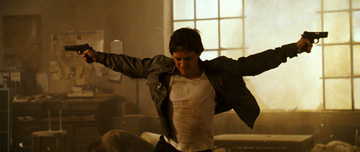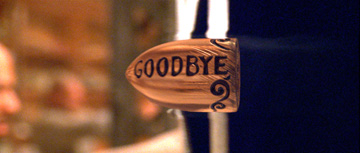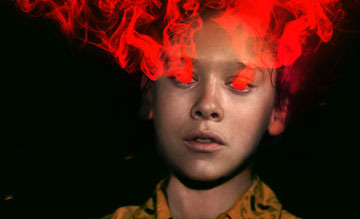
Fool me once, shame on you. Fool me [twice], you can’t get fooled again. A leaden mishmash of The Matrix, Fight Club, and various much-more-entertaining FPS shoot ’em ups, Timur Bekmanbetov’s aggressively dumb and derivative Wanted is what I’d call a total misfire…if it wasn’t totally in keeping with the similarly adrenaline-fueled, barely coherent nonsense that was Night Watch. I haven’t read the source material, although a quick peek at the Wikipedia (and the fact it was penned by Mark Millar) suggests it was probably much more wry and entertaining than this flick turned out to be (and made more sense, given it’s set in a universe with supervillains.)
As it is, however, Wanted plays like Michael Bay’s version of Gus Van Sant’s Elephant, a hyperbolic, stultifying stupid, aggro-laced paean to the Columbine mentality. Now, I’m all for leave-your-brain-at-the-door actioners, and I could forgive Wanted its video game physics, its cheap-and-easy nihilism, its plagiarism from much better movies, and its intrusive whiteboy angst-metal if the movie actually turned out to be entertaining. But, a few minor setpieces aside (namely the limousine hit, which was everything ths film should’ve been in 60 seconds — perhaps Bekmanbetov should try his hand at videos), Wanted is basically the opposite of fun. Like Night Watch, it’s so bogged down by turgid plotting and long bouts of needless exposition (as well as, in this case, scenes cobbled together from other sources) that the film has no pulse. How bad is it? When a baby started screaming in my theater during the final act (when Morgan Freeman started monologuing yet again in the Fraternity’s library), prompting a yelling match between the disgruntled babyless (“Get that goddamn kid out of here!) and the babied (“F**k you! Babies have rights too!“), I was kinda thankful for, at long last, an entertaining diversion.
As Wanted begins, we are introduced to one Wesley Gibson (James McAvoy, who seemed to have learned his American accent solely from Billy Zabka movies and Sprite commercials.) Gibson is a depressed, obsequious worker drone somewhere in the Great American Cubicle Hive — Chicago, to be precise. He hates his job, he hates his boss, he hates his routine, and his “best” friend is pretty obviously sleeping with his aggravating girlfriend. Gibson is such a capital-L Loser, in fact, that his relatively common name brings up 0 hits on Google. (Sigh…would that were the most ridiculous thing about this movie.) One day, however, he is approached in the local supermarket by “Fox”, an alluring — albeit currently on the wrong side of skinny — minx (Angelina Jolie, trying but clearly bored), who immediately gets him involved in a shoot-out and car chase against a rival killer (Thomas Kretchmann).
From there, Gibson is soon initiated into a secret and ancient cabal of assassins known as the Fraternity, led by Morgan Freeman (playing Lawrence Fishburne playing Morpheus) and including members such as The Gunsmith (Common), The Butcher (Konstantin Khabensky), and The Repairman (Marc Warren). Each of these FPS Minibosses, basically, train Gibson in the arts of their order (it seems to involve him needlessly getting his ass kicked a lot) until he’s reached his full potential as a genetic prodigy, and can thus seek out and kill the murderer of his father. But who are these assassins actually killing, and for what purpose? Even total badasses, it seems, aren’t free of the occasional moral quandary.
That’s basically the set-up — If it sounds like you’ve heard variations on this story before, you have. I neglected to mention the scene involving Gibson’s father’s final mission, which [a] plays almost exactly like Trinity’s early shenanigans in The Matrix and [b] first establishes that, here, bullets not only travel for miles but can bend their trajectory in flight. This may sound like a cool idea to some, I guess — for me, it put me right in House of Flying Daggers mode. Once you’ve established something so ridiculous, it’s hard to feel invested in any of the ensuing action sequences. There’s no danger at all if the laws of physics don’t apply — You’re just going to show me what you show me, and that’s that. (I would argue that movies like The Matrix bend these sorts of rules, but don’t break them. Besides, the Wachowskis introduced a higher-level threat with the Agents anyway.) In any case, magically-bending bullets is only one example of the suspension of disbelief required here. Don’t get me started on the Loom, or the Moravian Express, or the Total Miracle Body Bath, or anything else in Wanted. Like Night Watch, it doesn’t make a lick of sense.
Again, I could have looked all that over if the movie was good fun regardless. But, it’s not. When Wanted isn’t drowning in expository gobbledygook — which is most of the time — it brays at you with idiotic macho posturing. (There’s a reason a Dubya quote came to mind above when writing this — this is a film tailor-made for “windshield cowboys” and tough guy poseurs.) In other words, Wanted is basically Fight Club for the fratboy Nickleback set, without the intellect or sense of irony that made Fincher’s movie one of the best of the ’90’s. Jolie especially does what she can — she’s a star through and through — but she can’t redeem this boring, moronic pile of dren. In other words, folks, Wanted is effing terrible. In the final moments, McAvoy breaks the fourth wall and asks us, “What the f**k have you done lately?” Sadly, I went to see this film.


